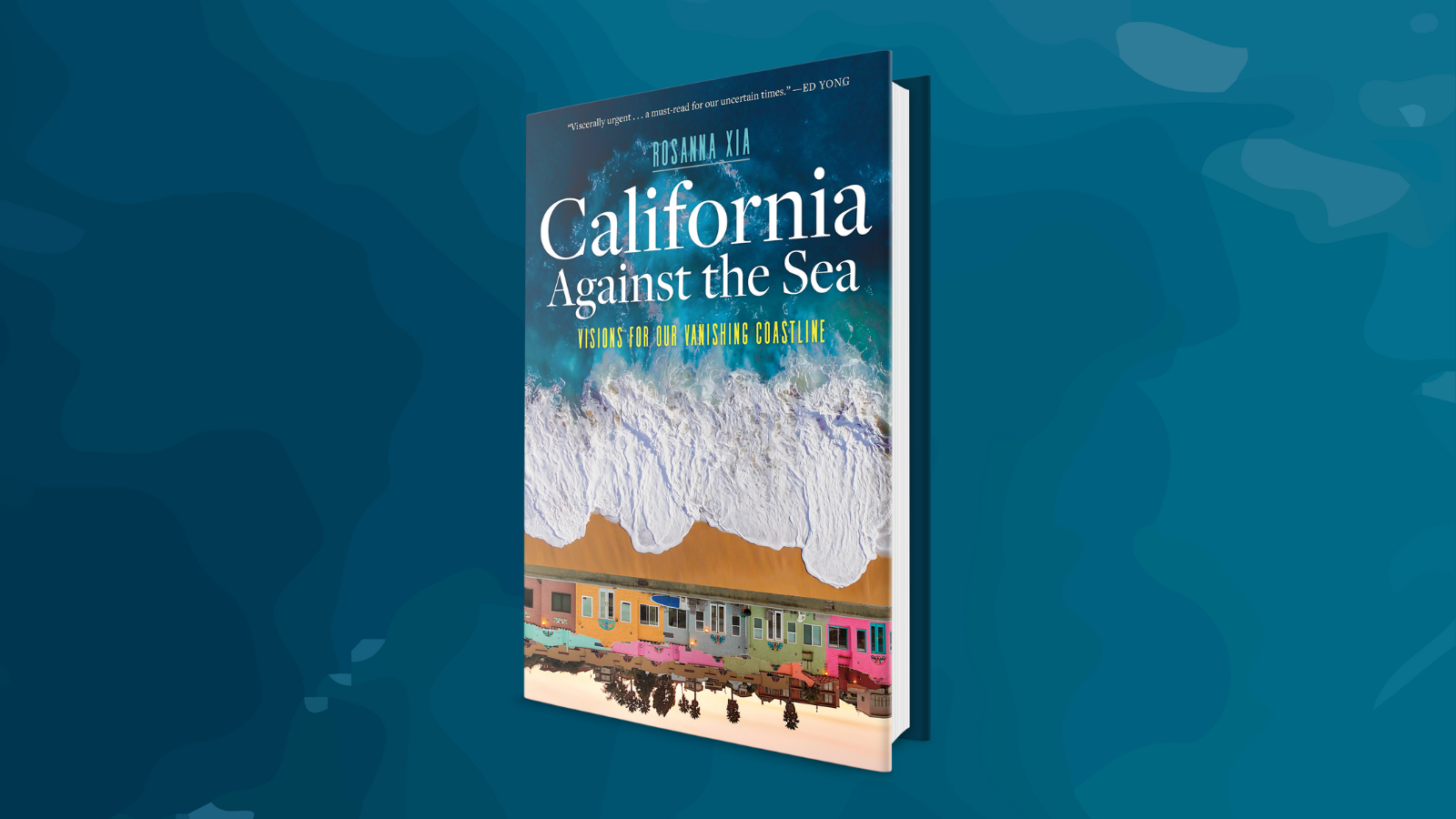FOR IMMEDIATE RELEASE
Pulitzer Finalist Sounds the Alarm and Offers A Way Forward for Confronting Sea Level Rise
In a new book, celebrated environmental journalist Rosanna Xia reveals what we stand to lose as the world’s oceans expand—unless we can begin to imagine more climate-wise futures.
BERKELEY, CALIF. — Wherever land meets sea, global warming is wreaking havoc. As the ocean absorbs heat generated by human industry, its waters swell into higher-than-high tides and city-leveling storms. Venice sinks, Louisiana shrinks, Indonesians flee their seaside capital, and North Carolina’s beaches are disappearing like a time lapse with no end. For the last hundred years, California’s 1,200-mile Pacific coastline has enjoyed relative calm due to a rare confluence of atmospheric factors. But shifting tides exacerbated by climate change are bringing this serene century to a screeching close. In California Against the Sea: Visions for Our Vanishing Coastline, Pulitzer finalist Rosanna Xia dives deep into the stakes, stopgaps, internecine struggles, and potential paths forward for the 27 million people who call this coastline home.
Voyaging across the state, Xia—a veteran coastal reporter for the Los Angeles Times—pulls the curtain back on the trepidations of scientists, the tenacity of activists, and the pitched battles intensifying in more than 20 communities dotting the California coast as they grapple with rising waters. These waters, which could surge by as much as 6–7 feet by century’s end, threaten to push the shore inland by a measure of multiple football fields. This anticipated surge imperils tens to hundreds of billions of dollars of human settlement—seawalls notwithstanding—to say nothing of the risk posed to human and non-human life. The scale of this prospective destruction and displacement could rival the impacts of the state’s raging wildfires.
The challenge, Xia says, is How do we get more people to care? How do we convey urgency? How do we tell them it’s now, not later? Through graceful, in-depth reporting Xia addresses herself to these questions, exploring how development and other vested interests have trumped science, how low-income communities bare the disproportionate brunt of environmental catastrophe (and are poised to do so again), how an attitude of human supremacy has hobbled our imaginations to envision what the coast could be, and how we may yet forestall impending devastation if we can find the way to embrace our collective capacity for change—in time.
Media Contact:
Kalie Caetano
Marketing & Publicity Director, Heyday
Megan Posco
Publicist, Posco Publicity
For review copies, feature interest, and interview and image requests, get in touch: publicity@heydaybooks.com and/or megan@poscopublicity.com
Advance Praise for California Against the Sea
“Just as the coast defines the liminal world between land and sea, so too does Rosanna Xia’s remarkable book exist in the overlap between development and erosion, between geological forces and human desire, between our ambitious past and our tenuous future. It’s viscerally urgent, thoroughly reported, and compellingly written—a must-read for our uncertain times.”
—ED YONG, author of An Immense World
“This book should be required reading for Californians—and all Americans. The fate of one state’s rising coastline, and what it portends for our future, will affect us all. Exquisite and wrenching, Rosanna Xia has written an essential book that shows us what we stand to lose.”
—LIZZIE JOHNSON, author of Paradise: One Town’s Struggle to Survive an American Wildfire
“Fans of Xia’s work for the L.A. Times will recognize her virtuosic blend of propulsive boots-on-the-ground storytelling, explanatory reporting, and genuine curiosity and love for place. A profound and timely exploration of humanity’s various and shifting relationships to coastlines and the forces that shape them by one of the great environmental reporters working today.”
—LISA WELLS, author of Believers: Making a Life at the End of the World
“Xia’s prophetic and perceptive book reveals a California coastline denied by centuries of settlers more intent on dreaming than facing the unsteady reality of the living ocean’s edge. California Against the Sea is the invitation we need today to enter a future where we learn to work with nature instead of against it. Xia’s message should be heeded everywhere ocean meets land.”
—MEERA SUBRAMANIAN author of A River Runs Again: India’s Natural World in Crisis, from the Barren Cliffs of Rajasthan to the Farmlands of Karnataka
“In the midst of the climate crisis, can the people of California treat the rising Pacific Ocean as something other than an adversary? In California Against the Sea, Rosanna Xia argues persuasively that such a transformation is not only possible but already underway, inspired by lessons from deep history and the recent past. Rigorously reported and beautifully written, this book is a crucial guide to the future.”
—MICHELLE NIJHUIS, author of Beloved Beasts: Fighting for Life in an Age of Extinction
“Xia’s California Against the Sea deftly charts the past, present and future of California’s changing coastlines in order to retrieve hope for more sustainable futures from headlines of environmental loss. This lucid account shows that sea-level rise is less an intractable problem than an urgent invitation to rethink our relationships with oceans and with one another. A beautiful, revelatory and prescient book.”
—LUCAS BESSIRE, author of Running Out: In Search of Water on the High Plains
“Rosanna Xia’s ability to move effortlessly between the journalist’s voice, the historian’s voice, and even the poet’s voice makes her story of our climate precarity more than an account of evidence and circumstance. The book is rife with humanity, nuanced and powerful because of it.”
—OBI KAUFMANN, author of The Coasts of California

Rosanna Xia is an environmental reporter for the Los Angeles Times, where she specializes in stories about the coast and ocean. Her work spans feature writing to investigative reporting and engages themes of climate and social justice. Xia’s reporting has uncovered the dumping of toxic DDT waste off the Los Angeles coast; set the record straight on the seizure of Bruce’s Beach from its Black proprietors (prompting an unprecedented reparative land return in 2022); explored the impacts of coastal gentrification; and articulated the dangers posed to shorelines by pollution and heating oceans. She was a Pulitzer Prize finalist in 2020 for explanatory reporting on sea level rise, which inspired the work that culminated in California Against the Sea. Her writing has been anthologized in the Best American Science and Nature Writing series.
A Q&A with Rosanna Xia
As you travel the California coast, what does connecting with the ocean mean to you?
ROSANNA XIA: Connecting with the ocean has meant connecting more deeply with the land. The two are inseparable when it comes to understanding the past, present, and future of our coast. I’ve learned to see land as a tide that also rises and falls. I’ve come to appreciate our wave-battered cliffs that feed the sand on our beaches, and to cherish our half-submerged marshlands and all the vanishing, in-between spaces that once moved with the rhythms of the sea. The ocean is constantly shaping and sanding and nurturing our shoreline, and I find myself admiring these subtleties every time I’m out by the water.
You explore the possibility of having a more reciprocal relationship with nature as a direction toward more climate-wise action. What does this reciprocity entail?
ROSANNA XIA: I’ve been reflecting a lot on all the knowledge that we’ve collectively lost in the process of hardening our shoreline and building the California coast as we know it. We’ve walled off the sea, buried critical wetlands, and paved over ancient dune systems that once buffered our beaches. We’ve ignored Indigenous ways of listening to the water and sacrificed (and further disempowered) historically vulnerable communities for the sake of industrialization.
There exists more than one way to live with rising water, but our current notion of what the coast should be has overshadowed the possibilities of what could be. We keep building walls to protect what we know, but is this really the only way forward?
As a writer confronting climate change, how do you navigate the emotional impacts of seeing the impacts occur, and knowing they will get worse?
ROSANNA XIA: For years, I struggled with how to balance the “right” amount of hope and despair whenever I wrote about climate change. Too much hope might diminish the urgency. Too little can lead to defeatism and inaction.
But the longer I’ve reported on climate change, the more I’ve discovered it is not the feeling of hope, but responsibility, that grounds me. We have a responsibility to take better care of the air that we breathe, the land that we rely on, the ocean that has quietly absorbed the brunt of our emissions. This duty to clean up the messes of our past, and to reconsider how we want to live in the future, is now what guides my reporting and writing.


